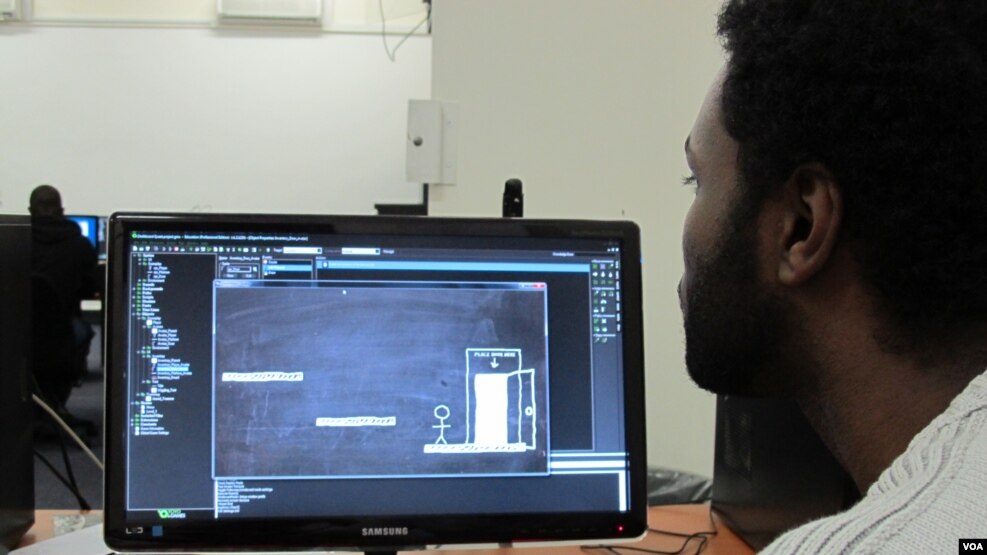The global video game industry is huge - worth $78 billion in 2012 - the size of the world’s movie and music businesses combined. Yet almost all games are produced in the developed world. But now Africa is slowly making its mark on the global industry as independent game developers begin to carve their creative niche and hone their technical skills.
 |
| Students studying Game Design at Wits University, Johannesburg, May 27, 2014. (Gillian Parker/VOA) |
At Wits University in Johannesburg, game design students tap furiously on keyboards, staring intently at computer screens perfecting their prehistoric looking characters or ridding their games of glitches. Students at Wits aspire to contribute to the growing video game industry. South Africa’s video gaming market is currently worth around $163 million - which just accounts for consoles and games on disc.
“As a medium it is so young, there’s not a very deep discourse about it yet. With game development we are still falling over our feet. There’s not too much discussion on how to create, how to use the interactive media in a greater scope. That’s really where the importance comes in game design education,” said Timothy Flusk, a third year student studying game design.
Hanli Geyser is a game design lecturer at the university. She is also a founding member of MakeGamesSA, which has become instrumental in supporting the community of game developers in South Africa.
The hard reality, she says, is that many of the students will not be game developers for the rest of their lives but a strong IT industry in South Africa and a burgeoning video gaming business offers strong prospects for future students.
“The guys who are building the games are watching us carefully to see what happens… people are interested to see if the dual nature of having engineers and artists working together throughout their degree can help produce the holy grail - which is the tech artist - people who can go into animation and advertising - and speak between the technical and the artistic where you currently have gaps in understanding,” said Geyser.
A lot of independent gamers are pretty much learning as they go. Dominic Obojkovits is the co-creator of Pixel Boy, a top-down dungeon crawler where players can craft armors and build weaponry prowess to overcome the dangers of the dungeon. Obojkovits began developing games and mobile phone apps at 15, teaching himself the skills to code and create. He believes that South Africa’s game developers are in a unique position.
“We are sitting with a lot of cultural diversity…that tends to lead to very interesting products being made and because of that, there is a huge potential for success from a creative perspective and all we need to do is improve our technical skills…and then we can be serious contenders. South Africa definitely has the potential,” said Obojkovits.
After years of work, Pixel Boy is now being released on the world's biggest online games distribution service, Steam. The digital market, Obojkovits says, is an enormous factor in boosting the local indie game industry, which is now exposed to a global audience.
“Not having to put down money for retail space and all those production costs have really opened up the ability for those who just want to make games to be able to and then release them without as much start-up capital and investment - which has also led to more experimental games because you can be a bit more risky when you are not throwing huge amounts of money at a project,” he said.
However, 70 percent of all games are still bought off the shop shelf, making it crucial for today’s up and coming game developers to be able to pitch to both digital and traditional retail markets.
Travis Bulford is a co-creator of South Africa’s first successful video game in 1996 called Toxic Bunny, based on a coffee guzzling, gun-slinging maniac who is having a really bad day. His company, Celestial, has sold 150,000 units internationally. Despite Celestial’s meteoric rise, the developer runs on a small team. Bulford says that creating a sustainable career depends on gamers being able to multi-task.
“You really have to be a one-man publishing house," he explained. "At the moment, we are producing it, we are marketing it, we are trying to retail it, we are trying to do the live appearances, we are trying to be a visible online and communicate with the people and talk to publishers…you are developing a lot of skills, and if you lack in any of those departments, you actually struggle.”
Bulford says that funding remains a problem for many African entrepreneurs, who battle to get the financial backing to expand workforces and reinvest in their companies.
Desktop Dungeons, Pixel Boy and Toxic Bunny are just a few of South Africa’s video games that have hit the global arena. There is clearly the enthusiasm and the drive in South Africa, but a cash injection could ensure true growth, creating jobs and long-term stability making game development a realistic career choice for the country’s youth.
Original Source Voanews

Aucun commentaire:
Enregistrer un commentaire